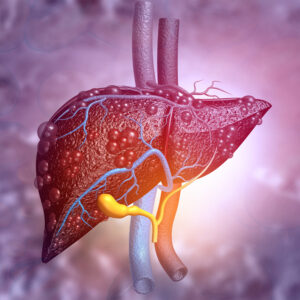While there is currently no cure for fatty liver disease (FLD) or nonalcoholic steatohepatitis (NASH), a condition to which FLD can lead, the pharmaceutical industry is turning to clinical research to understand the causes, development, and treatment of these diseases.
To better understand attitudes toward clinical research and why patients might consider a clinical trial focused on liver disease, patient recruitment specialists with SubjectWell fielded a survey of 561 at-risk patients in November 2020. The patients surveyed were all above the age of 50 and had type 2 diabetes (a risk factor for developing FDL or NASH). Out of all the at-risk respondents, 74 individuals were already diagnosed with either FLD or NASH and 467 individuals were undiagnosed.
SubjectWell asked the undiagnosed population if they would be willing to participate in a trial for a disease they were at high risk of developing. The data show that a small majority (57%) of these patients would be willing to participate. Diagnosed patients were then asked if they would be willing to participate in clinical research related to their condition. The data show that a majority of these patients would, with FLD patients demonstrating more interest (72%) than NASH patients (61%).
Patients who were already diagnosed with liver disease reported expectations for obtaining better treatment, obtaining education about treatment, and receiving a doctor recommendation as top motivators for clinical trial participation.
According to SubjectWell, together, FLD and NASH impact the lives of more than 100 million Americans, and by 2030, prevalent NASH cases are predicted to increase by 63% and become the most common reason for liver transplants in the U.S. Further, these conditions disproportionately affect Hispanic communities, which have a prevalence of type 2 diabetes.
In the survey, Hispanic respondents were more likely (88%) to report the desire to “help others who are suffering and advance science” as a motivator for clinical trial participation than non-Hispanics (79%).
Edited by Gary Cramer



